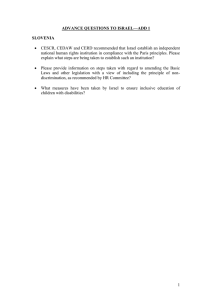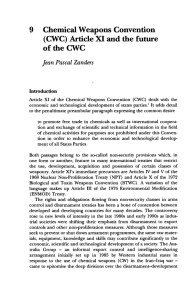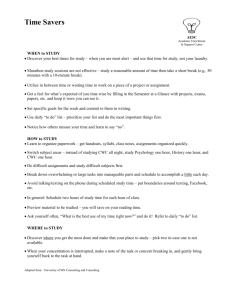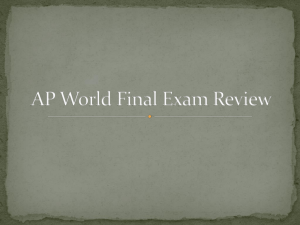BRINGING THE CHEMICAL WEAPONS CONVENTION INTO
advertisement
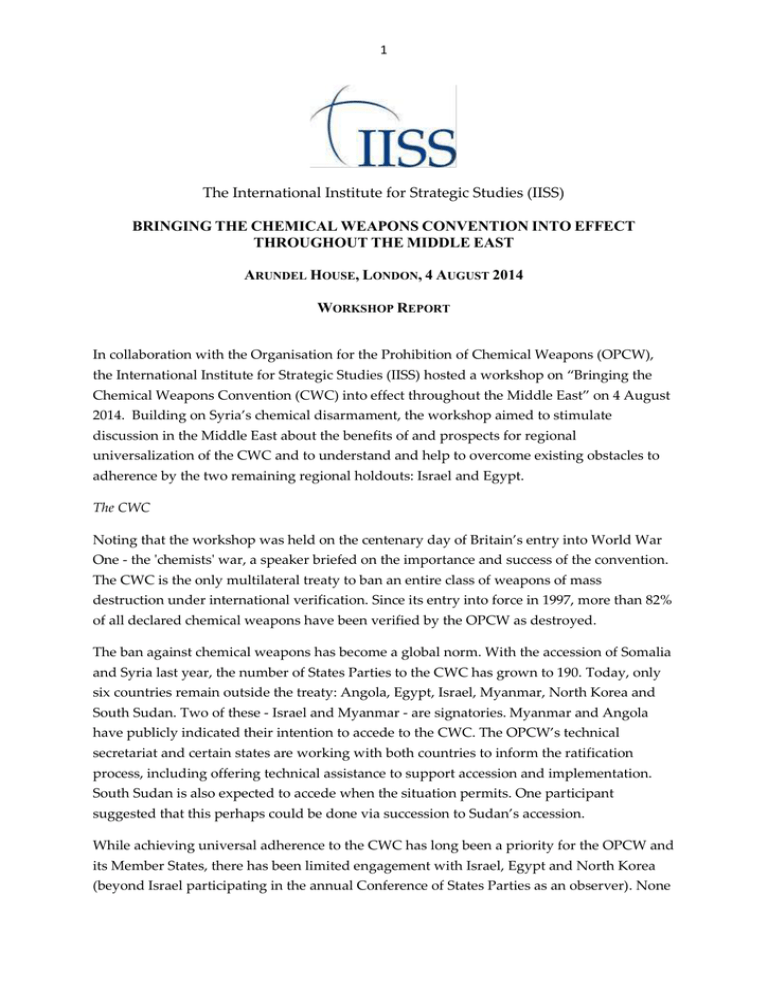
1 The International Institute for Strategic Studies (IISS) BRINGING THE CHEMICAL WEAPONS CONVENTION INTO EFFECT THROUGHOUT THE MIDDLE EAST ARUNDEL HOUSE, LONDON, 4 AUGUST 2014 WORKSHOP REPORT In collaboration with the Organisation for the Prohibition of Chemical Weapons (OPCW), the International Institute for Strategic Studies (IISS) hosted a workshop on ‚Bringing the Chemical Weapons Convention (CWC) into effect throughout the Middle East‛ on 4 August 2014. Building on Syria’s chemical disarmament, the workshop aimed to stimulate discussion in the Middle East about the benefits of and prospects for regional universalization of the CWC and to understand and help to overcome existing obstacles to adherence by the two remaining regional holdouts: Israel and Egypt. The CWC Noting that the workshop was held on the centenary day of Britain’s entry into World War One - the 'chemists' war, a speaker briefed on the importance and success of the convention. The CWC is the only multilateral treaty to ban an entire class of weapons of mass destruction under international verification. Since its entry into force in 1997, more than 82% of all declared chemical weapons have been verified by the OPCW as destroyed. The ban against chemical weapons has become a global norm. With the accession of Somalia and Syria last year, the number of States Parties to the CWC has grown to 190. Today, only six countries remain outside the treaty: Angola, Egypt, Israel, Myanmar, North Korea and South Sudan. Two of these - Israel and Myanmar - are signatories. Myanmar and Angola have publicly indicated their intention to accede to the CWC. The OPCW’s technical secretariat and certain states are working with both countries to inform the ratification process, including offering technical assistance to support accession and implementation. South Sudan is also expected to accede when the situation permits. One participant suggested that this perhaps could be done via succession to Sudan’s accession. While achieving universal adherence to the CWC has long been a priority for the OPCW and its Member States, there has been limited engagement with Israel, Egypt and North Korea (beyond Israel participating in the annual Conference of States Parties as an observer). None 2 of these countries have communicated a change in their position in relation to the CWC, nor have they sought to take up offers of engagement in OPCW activities. Syria Events in Syria reinforced the global consensus against chemical weapons and spiked interest in the universalization of the treaty. Despite scepticism over the likelihood of success and troubles along the way, today 100% of Syria’s declared chemical weapons have been removed and are in the process of being destroyed. The OPCW confirmed that there was ‘no chance of diversion’ as everything had been inventoried and documented along the way. One expert highlighted the failure to hold the Syrian regime accountable for its use of chemical weapons, notwithstanding the considerable evidence that has been collected. While establishing accountability need not be a measure of the success of disarmament efforts, the speaker questioned the utility of extending the ban on chemical weapons if it is not possible to punish those who are non-compliant. While some issues remain (including destruction of all production and storage facilities and verification of the completeness of Syria’s declaration),1 the removal and on-going destruction of 1,300 tons of chemical weapons – what was once the largest arsenal in the Middle East – is a significant success, one that was unimaginable less than a year ago. Today, Syria’s disarmament presents the region with a real opportunity to move closer to universalization. Egypt and Israel – the region’s two holdouts Today, Egypt and Israel are the only two states in the region not bound by the CWC. Although Israel signed the CWC in 1993, it never ratified it. The Israeli government discussed it more than once, including most recently at a cabinet meeting in September 2013, after the US-Russia deal on removal and dismantling of Syria’s chemical weapons, but decided against ratification at this time. Foreign Ministry spokesman Yigal Palmor said ‘Israel would not ratify the weapons convention as long as other states in the region that possess chemical weapons refuse to recognize Israel and call for its destruction… The threat of using chemical weapons against the civilian Israeli population is not theoretical or distant.’2 How this statement squares with Syria’s agreement to ship out its CW was left unstated, other than the implicit assumption that Assad would cheat on his declaration. Ongoing 1 Dina Esfandiary, ‘Syria and the removal of chemical weapons’, IISS Voices, 25 June 2014, http://www.iiss.org/en/iiss%20voices/blogsections/iiss-voices-2014-b4d9/june-4703/syria-and-chemicalweapons-584a 2 ‘Israel opts to stay vague on chemical arms in wake of Syria disarmament’, Haaretz, 31 October 2013 http://www.haaretz.com/news/diplomacy-defense/1.555387 3 OPCW verification efforts may soon lay this issue to rest. It was noted that Syria’s CW disarmament means that today, the only other state not party to the CWC in the region, Egypt, recognises Israel and is not a threat to Tel-Aviv. While questions about the completeness of Syria’s CW declaration remain, it was argued that the potential retention by Syria of a few tonnes of such weapons would not present a significant threat. Indeed, the Israeli government has ceased distributing gas masks. Tel-Aviv also fears the ‘slippery slope’ effect: accession to the CWC may increase pressure on it to join all other non-proliferation treaties. Israel is also uncomfortable with the provision allowing for ‘challenge inspections’ which it fears could be abused to probe Israel’s nuclear secrets. In addition, Israel may want to maintain the policy of WMDambiguity. Ratifying the CWC entails clarification about past CW activities. Some participants judged that Israel still maintains CW and that declaring them would trigger negative domestic and international reactions. Finally, Tel-Aviv wants tangible benefits from CWC accession, for example, regional discussions on security and both conventional and non-conventional threats. Egypt does not argue against CWC accession per se, but insists that it cannot accept any more non-proliferation obligations until Israel joins the Treaty on the Non-Proliferation of Nuclear Weapons (NPT). In the 1990s, following the drafting of the CWC, Egypt promoted an Arab boycott of the CWC and Biological Weapons Convention (BWC), but today it is alone in its refusal to accede to them. No reason to stay out Several participants argued that today there is no reason for either state to remain outside the convention. One speaker explained that one of the main reasons for not ratifying the treaty has been removed: the removal and destruction of Syria's declared stockpile represents the elimination of a hostile state's WMD capability - one that was conceived and built as a deterrent against Israel An Israeli participant explained the government’s fear that ratification of the CWC would place additional ‘intolerable pressure’ on Israel to accede to other non-proliferation treaties. But other participants questioned why the pressure would increase; suggesting instead that ratification would relieve it. Workshop chairman Mark Fitzpatrick wrote afterwards that acceding to the treaty would ‘help Israel climb out of the public relations hole its military attacks in Gaza have created in the eyes of much of the world’.3 A European speaker explained that Israel has already signed the convention, just not ratified it. This commits Israel not to take any actions that are in contravention to the aims and objectives of the convention. Any ambiguity that Israel might have wanted to preserve was already lost 3 Mark Fitzpatrick, ‘Time for Israel and Egypt to abjure chemical weapons’, IISS Politics and Strategy, 6 August 2014, https://www.iiss.org/en/politics%20and%20strategy/blogsections/2014-d2de/august-bce1/time-forisrael-and-egypt-to-abjure-chemical-weapons-0490 4 through its signature. In addition, according to one Israeli speaker, joining the convention will give Israel ammunition to refute political attacks from its Arab neighbours on its ambiguous stance on weapons of mass destruction. Israel has also expressed its discomfort with the challenge inspections provision in the CWC. Article 9 allows any State Party in doubt about another State Party's compliance to request the OPCW Director-General to send an inspection team, with no right of refusal.4 The Syrian experience has shown how intrusive and penetrating inspections can be, and that they could easily be used for politically motivated reasons against a state. Israel fears that the provision will be abused and it will be harassed with inspections. One speaker agreed that they were a ‘powerful tool’, but Syria was a unique case, having just used chemical weapons. To date, a challenge inspection has never been requested. States may have been deterred from invoking it, lest they will face a challenge inspection in return. According to the same speaker, ‘experience shows that states joining the convention willingly and in good faith are treated with respect and in a spirit of co-operation’. The same will apply for Israel. A European speaker outlined the dilemma that Egypt would be faced with should Israel accede to the CWC. Today, Egypt has a leading role in the preparatory discussions on a conference on a Middle East Zone Free of Weapons of Mass Destruction (hereafter WMDfree zone) and it wants the focus to remain on nuclear weapons. After recent events, it is clear that the overwhelming majority of Middle Eastern states and their people see chemical weapons as abhorrent. They therefore cannot be used as a bargaining chip in negotiations. Israeli ratification could provide Egypt with an opportunity and political cover to adjust its stance and claim at least a partial victory for its linkage policy because Israel would have eliminated one category of nonconventional weapons and joined the CWC, albeit not the NPT. According to a European speaker, it is in Egypt’s interest to join the CWC because pursuing the zone incrementally rather than all at once maximises the likelihood of achieving it. Although not everyone agreed, it was suggested that this would also maximize the pressure on Israel to eventually join such a zone. A European official explained that having Egypt and Israel inside the CWC would strengthen cooperation on preventing non-state actors from obtaining chemical weapons. The economic argument for accession to the convention is also important: according to one speaker, Egypt's new President is keen to revitalise the economy, and Israel will want to maintain its competitive edge in hi-tech industries, including the chemical industry. Remaining outside the CWC prohibits any transfers of either schedule 1 or 2 chemicals involving states parties. 4 According to Article 9, paragraph 17, the OPCW’s Executive Council may refuse the challenge inspection (no later than 12 hours after having received the request) by a three-quarter majority should it judge that the request was unfounded. 5 Finally, the political and reputational cost of remaining outside the treaty needs to be considered. It is ‘a matter of time’ before Myanmar, Angola and South Sudan join the CWC, which would leave only Israel and Egypt - alongside North Korea - outside of it. The removal of Syria’s chemical arsenal delivered an important security dividend to the region, which prompted Israeli President Shimon Peres to state that Israel should now consider joining the CWC. Because chemical weapons are not essential to national security, it was argued that Syria’s accession should be matched to remove any doubts about the status of chemical weapons in the region. Next steps Participants also discussed accession timelines and confidence building measures that both states could take. If immediate ratification is too difficult, one speaker suggested that both countries conduct voluntary declarations of all industrial Schedule 2, 3 and other chemical production facility (OCPF) sites. This would be seen as an initial confidence building measure and therefore not necessarily comprehensive. This could be followed by voluntarily declaring Schedule 1 facilities; issuing an Article 10-type statement on CW defence programmes; issuing a voluntarily report on or passing CWC-compatible implementing legislation, for example on the export and transfer to, and to prevent the acquisition of materials and technologies by terrorists; inviting the OPCW technical secretariat to inspect one site each according to verification annex rules; inviting the technical secretariat to review lessons learnt from such declarations/visits/inspections series, perhaps leading to annual visits. One other suggestion was for Israel to conduct ‘mock inspections’ at some of its facilities to explore the possibility of allowing inspections while preserving sensitive military secrets. The OPCW is currently conducting similar exercises with Myanmar. One participant suggested that it might be preferable for Israeli officials to discuss ratification of the CWC with its neighbours: once Israel signals its willingness to ratify the CWC, the designated conveners of the Helsinki conference on the WMD-free zone (Russia, the United Kingdom, and the United States) could begin negotiations with Egypt over its accession to the treaty. This would be a step towards a WMD-free zone in the region. But according to one Israeli speaker, simultaneous accession is not necessary. Given that Israel faces fewer political obstacles to CWC adherence, ratification could instead be unilateral. One Israeli speaker outlined a three-stage campaign that would encourage Israeli ratification of the CWC: raising public awareness through the media and ‘making it an issue’, raising awareness in the Knesset and creating a technical group of experts to think of specific confidence-building measures and map out threat perceptions to address. Although efforts would be focused on Israel, much of the process could be mirrored in Egypt and would ultimately culminate in both countries acceding to the treaty. Rapporteur: Dina Esfandiary

